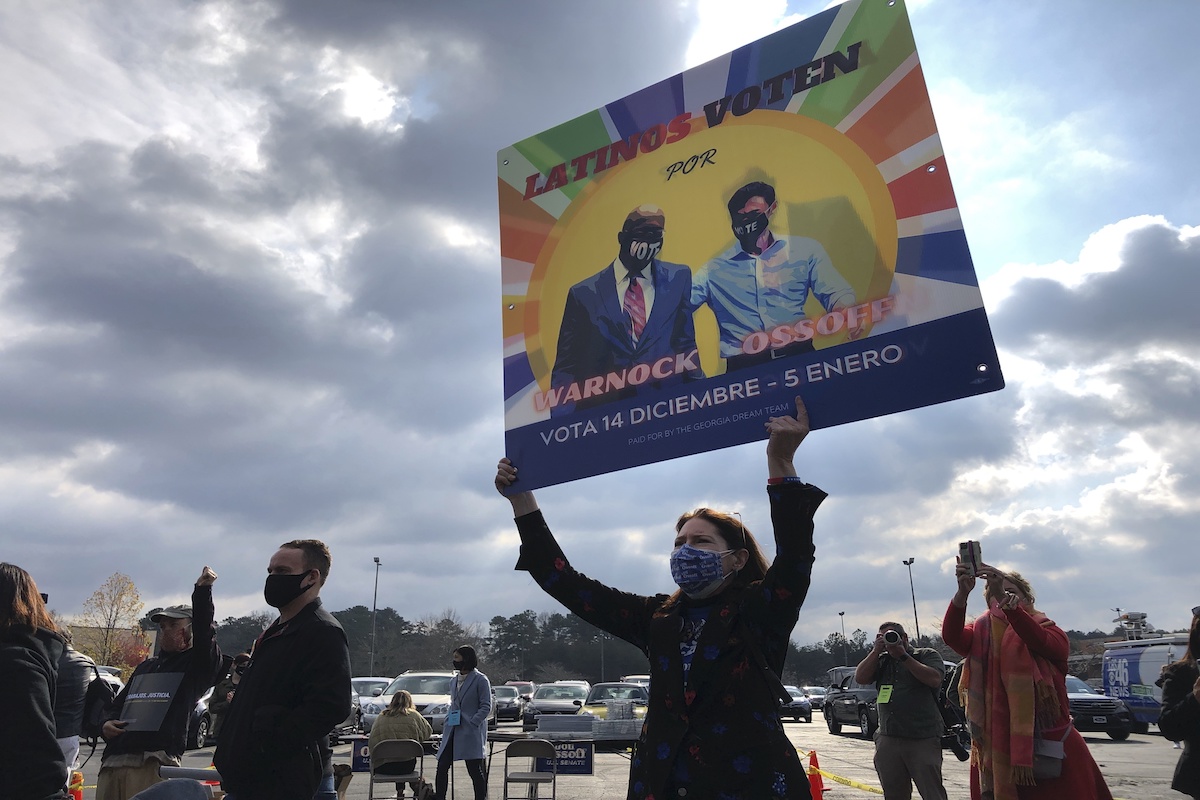

A supporter holds up a sign calling on Latinos to vote for Democrats Raphael Warnock and Jon Ossoff during a rally for Ossoff and former U.S. Secretary of Housing and Urban Development Julián Casto in Lilburn, Ga., Monday, December 7, 2020. (AP Photo/Jeff Amy)
By Lizet Ocampo
Among the many lessons learned in this year’s election, one standout is that Latino voter turnout showed the power of extensive, culturally competent voter education and outreach.
And in Georgia, we will soon discover whether progressive candidates have learned these lessons well enough to prevail again.
Two critical U.S. Senate runoffs present an opportunity for candidates to speak directly to Latinos throughout the state about the issues that are urgent in their communities. And they should seize it, because Latinos deserve solutions to the hardships we face and leaders we can trust to fight for them.
In Georgia, the devastating impact of COVID-19 is at the top of the list: Nearly 70 percent of Latinos in the state say that a federal stimulus bill is “very important.”
Americans from all walks of life have endured enormous suffering throughout the pandemic. But Latinos are bearing the brunt of its impact, with one public health expert describing it as a “historic decimation of Latino communities.”
That has been especially true in Georgia, where Latinos are overrepresented in the state’s essential workforce as poultry factory workers, farm workers, and construction workers.
During the spring, crowded working conditions and a lack of personal protection equipment sparked outbreaks in Georgia’s poultry factories, which disproportionately hurt Latinos. Although Latinos account for less than 10 percent of the Georgia population, they account for about one-third of all positive COVID-19 cases.
Georgia governor Brian Kemp largely ignored these early outbreaks, leaving Latinos to fend for themselves. He was among the last of his peers to institute a shelter-in-place mandate and one of the first to reopen non-essential businesses.
As cases among Black and Latino Georgians continued to soar, state officials repeated the lie that cultural differences and social behaviors, not working conditions, were responsible for the disproportionate share of cases in industries with essential workers.
Furthermore, job cuts in Georgia have also hit Latinos hard, leaving many of them struggling to make ends meet — let alone pay for five-figure hospital bills.
The months ahead could be even darker, particularly in the absence of significant federal pandemic relief.
Many Latinos in Georgia, including undocumented immigrants and their families who were excluded from receiving federal stimulus funds, have scraped by with the help of local nonprofits, churches, and other social service organizations. But we all deserve more.
Clearly, the status quo has failed Georgia’s Latinos—and Latinos nationally, who all have a stake in who controls the Senate.
Georgia’s Senate races will have a number of critical implications, including when it comes to defending DACA, which protects some immigrant youth from deportation, and providing pandemic relief for Latinos—as well as the millions of other Americans across the country who are unemployed, facing eviction, or struggling to put food on the table.
The candidates who deserve Latinos’ support are those who prioritize solutions that ease our suffering over their own personal interests.
Even before the pandemic, many Latinos ranked health care and the economy among their top political issues. But as the coronavirus ravaged the country across this year, those issues have been magnified alongside COVID relief as pressing needs for Latino families.
Record Latino turnout in the presidential election shows that the proof is in the pudding. Many local grassroots organizers have been working on the ground with Latinos in their communities for years to hear their concerns and empower them to use their voices at the ballot box. Their long-term commitment and dedication paid off on Election Day.
Candidates and progressive activists hoping to earn our political support should take a cue from these organizers. Take the time to build and nurture relationships with us and demonstrate that you understand our needs and our priorities.
The next big test is Georgia. But there will be many more.
***
Lizet Ocampo is the political director of People For the American Way. This op-ed was distributed by OtherWords.org.


